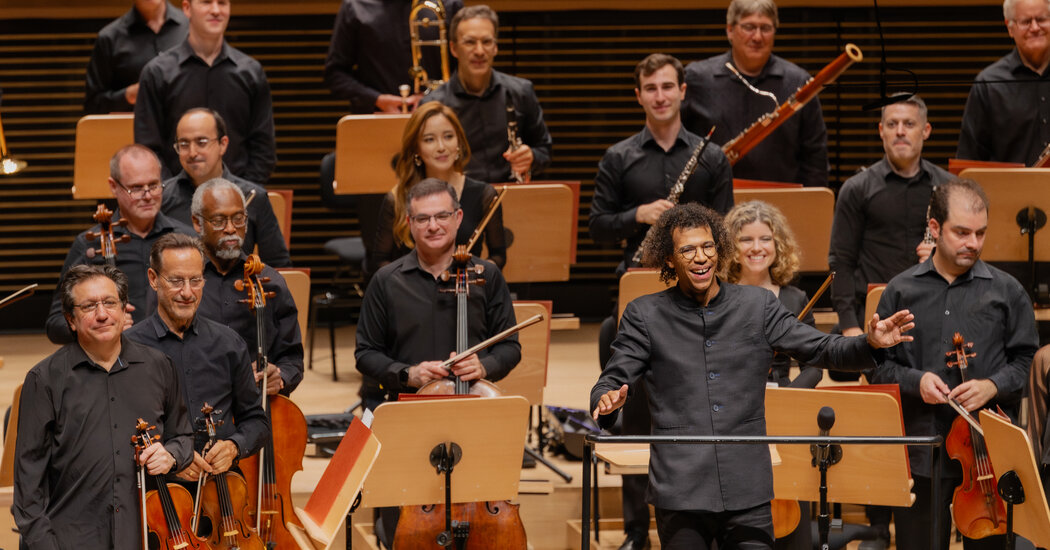Last summer, Lincoln Center bid farewell to the Mostly Mozart Festival Orchestra, a fixture of the city’s cultural scene since 1973, saying it was time to reimagine the ensemble for a modern and more inclusive age.
On Monday, the center offered a preview of its plans. While the ensemble will remain the same in size and membership, it now has a new name, a new music director and a program aimed at drawing more diverse audiences to classical music.
The Festival Orchestra of Lincoln Center, as the ensemble is now called, will convene in July for its first season under the rising conductor Jonathon Heyward, as part of the center’s Summer for the City festival.
Heyward said in an interview that he wanted to maintain the orchestra’s innovative spirit.
“It’s not that I am at all reinventing the wheel,” he said. “We’re just continuing in a way that is very much in line with a previous legacy of the orchestra.”
The lineup for this summer includes a world premiere by the composer Hannah Kendall; the North American premiere of Huang Ruo’s “City of Floating Sounds”; and classics by Beethoven, Haydn and, yes, even a little Mozart.
There will also be offerings aimed at drawing new people to Lincoln Center, including a “Symphony of Choice” concert in which audience members will be allowed to construct the program by voting, as well as an augmented-reality exhibition about mental health and Schumann, who suffered from depression.
The changes reflect the recent push under Henry Timms, Lincoln Center’s president and chief executive, to appeal to younger and also more diverse crowds. Those efforts have led to some broader complaints from audience members and music critics, who say the center is not doing enough to promote classical music — once a fixture of the summer season and festivals, but significantly reduced in recent years.
The Mostly Mozart Festival Orchestra was beloved by many classical fans, but its future grew hazy during the pandemic. The Mostly Mozart Festival, and several other named festivals at Lincoln Center had their final seasons in 2019, before the pandemic. They were replaced in 2022 by Summer for the City, featuring a wider variety of genres, including pop music, social dance and comedy.
The orchestra’s music director, Louis Langrée, who helped cement the ensemble’s reputation as an acclaimed interpreter of the music of Mozart and the classical repertoire, departed last year after more than two decades at the helm.
Last year, the center announced his successor: Heyward, 31, the first Black music director of the Baltimore Symphony Orchestra.
There are some signs that the ensemble’s audiences are beginning to change: Last summer, about 59 percent of attendees at Mostly Mozart concerts had never reserved a ticket to a performance presented by Lincoln Center before. Tickets for the festival orchestra’s concerts this summer, which will take place at the recently renovated David Geffen Hall, will be offered on a choose-what-you-pay basis, starting at $5.
Shanta Thake, Lincoln Center’s chief artistic officer, said in an interview that the center was focused on “really opening this up to huge swaths of New York City that have previously not been able to come to concerts.”
“We want to make sure that our audience feels as much a part of this conversation as these composers do,” she added.
Much of the coming season is aimed at forging the new connections with audiences.
For Huang’s “City of Floating Sounds,” audience members will be able to use an app to hear musical fragments around the city before attending the live performance.
The exhibition on mental health and Schumann is billed as an immersive experience that will explore the composer’s struggles as well as his admiration for the music of Bach. Heyward said he was eager to show “how the power of music can really be just a vehicle through very dark and difficult times.”
“Symphony of Choice,” which opens the season on July 20, will invite audience members to curate a concert by voting on a variety of symphonic excerpts. Heyward said he had been intrigued by the idea for many years.
“I’ve always been so fascinated about how we can make the audience feel like there’s a sense of ownership within the evening — that they’ve come to help create what is being performed,” he said.
Mozart will be featured at a pair of concerts in early August that includes the overture to his opera “Le Nozze di Figaro,” the “Haffner” symphony and other works. Heyward said the ensemble would maintain its connection to the composer.
“Mozart will always continue to be a huge part of the orchestra and the orchestra’s identity,” he said. “There’s no taking that away.”


